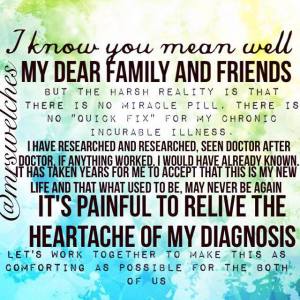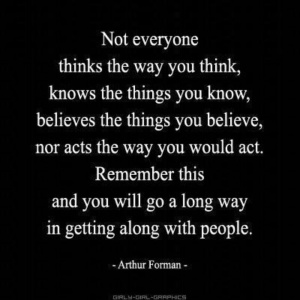There are some days when I wonder why I am dealing with this pain. I question why I’ve been through so many challenges in my short life. Sometimes I get frustrated by of my present circumstances, thinking that I stumbled into a life of bad luck. But then I remember this: It’s not all about me. The struggles that I face have the potential to change the life of another person. Because of my pain, someone else may be able to receive a proper diagnosis. Because of my past, someone else may be able to find freedom from their addiction. If I have to go through the darkness in order to bring light to someone else, then I will gladly do so, because this life is not all about me.
When I was first diagnosed with RSD, I was in 8th grade. I had wonderful teachers who took the time to make accommodations for me when necessary. They asked how I was doing, offered to help, and extended grace to me for the many missed assignments. Because of my pain, they learned about RSD. About a year after I graduated from that school, my 8th grade teacher’s daughter began to have pain with no known cause. Knowing my story, my teacher brought up RSD, and soon her daughter was diagnosed. My parents and I were able to offer support and recommend a hospital that could help her. If I hadn’t gone through my own battle with this monster, I would not have been able to help that girl, and she probably wouldn’t have received treatment as quickly.
When I was 17, I graduated from a program that completely transformed my life. I entered the doors broken and lost in eating disorders, depression, anxiety, and a self harm addiction. Eight months later, I was free from those struggles and found myself sharing my story with others. There was a girl who happened to hear my story, and she ended up applying for the program herself. Although we had different issues, she was able to find her own freedom because of my brokenness.
In 2012, I received an email from my 5th grade teacher. While I hadn’t yet been diagnosed when I was her student, she heard about my story through my mom and other teachers after she left the school. She eventually changed career paths and went into the medical field. The email was to let me know that she was giving a presentation about RSD/CRPS at a large EMS Expo. She wanted to help spread awareness for this condition after hearing about my battle with it. I ended up going with her to the expo, and I was able to share my story with a room full of healthcare professionals. Each person in attendance was given an orange packet filled with information about RSD/CRPS and how to treat patients with the disorder. Because of my story, these medical professionals know how to handle complicated cases such as my own.
When I was first hospitalized for full-body RSD/CRPS in 2006, I had an amazing Physical Therapist. She spent so much time learning about this monster and figuring out how to treat me. About 2 years ago, she told me that she was working on her doctorate and was spending a whole term studying CRPS. She was able to learn more and teach other therapists about this disorder because of her experience when I was her patient.
Last year, I received an email that my dad forwarded to me from one of his friends. He was talking about how he had met a doctor in the area who knew about RSD. This doctor used to work at a large hospital (*cough* The Worst Hospital Ever, if you’ve read any of my posts on that), but he has since opened his own pain center. He said that he had a young patient who was hospitalized for RSD/CRPS in 2006, and that it was partially because of this patient (uhh, that would be me) that he opened his practice. He hadn’t heard of RSD/CRPS until I was his patient, and he wanted to be able to help more people with their pain. So basically, my story led this doctor to leave the hospital setting, open up his own center, and treat patients with CRPS and other chronic pain. Woah.
These are just a few of the stories I’ve heard/experienced of ways my story has impacted others. I’m not saying that I’m the magical missing piece in these stories. It’s possible that these situations may have had the same outcome, even if I was never part of the picture. However, the fact that I was able to play a role in the help and healing of others makes me feel grateful for my struggles. If my pain even changed just one life, then it would be worth it all. It’s not all about me.
It’s easy to get so wrapped up in ourselves and our pity parties, forgetting that there are so many others out there who are in pain. You never know when you will touch a life or change a person’s path, simply by living out your own struggles. I’ve been able to walk alongside others in their own battles because of my own challenges. I’ve been able to offer a listening ear that truly understands pain rather than simply pretending to know. My story has caused others to receive help faster than they would have otherwise, it has informed many more doctors about RSD/CRPS, and it has changed lives in numerous other ways. I’m not saying that it’s all because of me, because it’s not, but these great things are coming out of the darkness of my life. Beauty from ashes.
Your story has meaning. Your life has purpose. Even if you feel like no good could possibly come out of your pain and struggles, I guarantee that you are touching lives in ways you don’t even know. Because of your story, someone else may be able to find a correct diagnosis. Because of your pain, lives may change. You just never know how your life will impact that of another person, just by choosing to stay alive. By choosing to fight. By choosing to simply be who you are.
Your story matters. Never forget that.

{Credit: Holley Gerth}


 You see, people always try to fix things. Broken car? Take it to a mechanic. TV stopped working? Call someone to fix it right away. Strep throat? Make a beeline for the doctor to get some medicine. We see what’s broken and our instinct is to fix it. But chronic illness is not the same as a broken car. It’s not as easy to repair as a television, nor is it cured by medication like strep throat. No, chronic illness is in a whole different category, one where the “fix it” gloves must come off.
You see, people always try to fix things. Broken car? Take it to a mechanic. TV stopped working? Call someone to fix it right away. Strep throat? Make a beeline for the doctor to get some medicine. We see what’s broken and our instinct is to fix it. But chronic illness is not the same as a broken car. It’s not as easy to repair as a television, nor is it cured by medication like strep throat. No, chronic illness is in a whole different category, one where the “fix it” gloves must come off. 
